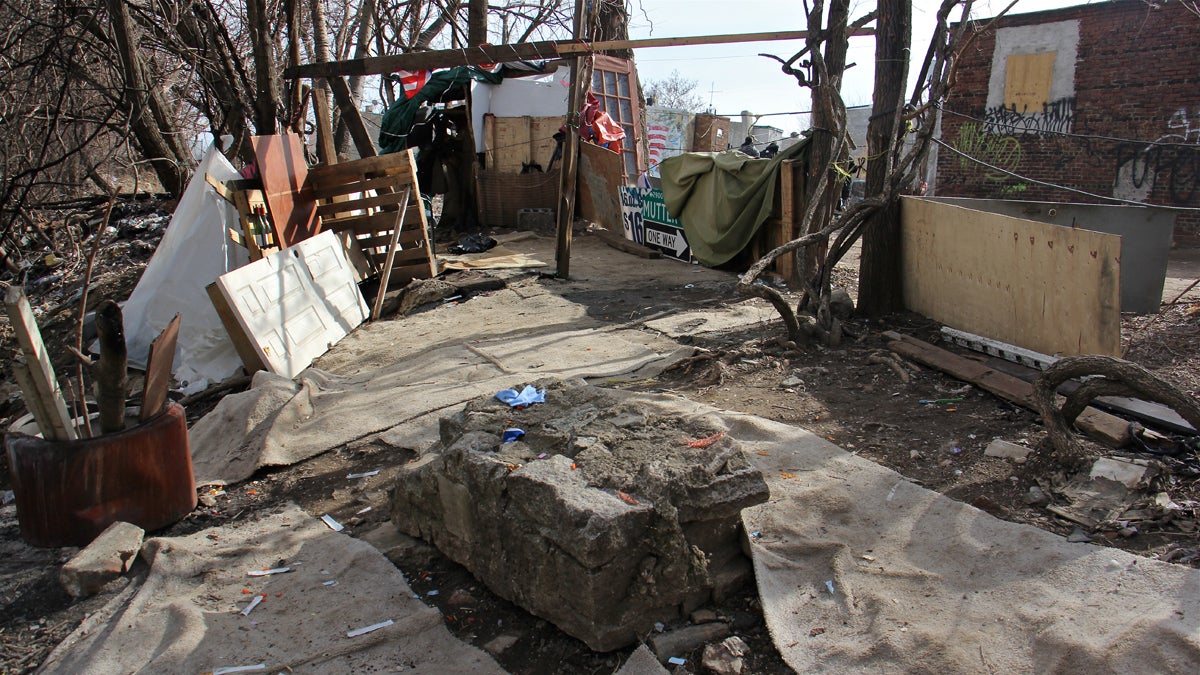Philly opioid task force has second thoughts on safe injection sites

At a heroin camp in Kensington, users who can't manage by themselves can come here and pay someone a few dollars for injection. (Emma Lee/WHYY)
Of the 20 recommendations Philadelphia’s opioid task force is mulling to deal with the city’s addiction crisis, none is more controversial than the one about creating sanctioned places where people can use heroin under medical supervision.
If you’re wondering how that could be legal, you’re not the only one.
The question came up at the task force’s final meeting last Wednesday.
City Councilman David Oh pointed out that heroin is classified by the U.S. Drug Enforcement Administration to be a Schedule I drug, meaning it has “no currently accepted medical use and a high potential for abuse.” The DEA considers other opioids, such as hydrocodone, methadone, and the synthetic fentanyl, to be dangerous, but have accepted medical uses.
Oh said designating a site where people could use heroin would violate federal law, which could prompt the state government to step in.
“I’m not saying you can’t do some new things and sometimes the federal government does not enforce all of its laws,” he said. “But if we were to do that… I am pretty sure that we would get a response from the general assembly basically preempting what we do either because they’re gonna do it uniformly for the state or they just don’t want it done.”
There are about 100 so-called “supervised” or “safe injection sites” around the world, mostly in Europe. Seattle officials approved opening two such sites earlier this year, but earlier this month, the Washington state Senate passed a bill that would ban these facilities statewide. So far, Vancouver, Canada is the only city in North America to operate a safe injection site.
Task force member Jeremiah Daley, executive director of the Philadelphia-Camden High Intensity Drug Trafficking Area program, said aside from the legal issues, he is not swayed by adovocates who say these sites effectively curb overdose deaths, while improving neighborhood conditions. He argues drug hotspots, such as Kensington have “many social ills above and beyond the drug trafficking and consumption there,” including poverty and blight.
“I don’t see this bringing relief to any of that,” he said.
Daley also sees big community battles ahead.
“It is difficult enough to get treatment facilities established in many neighborhoods and recovery housing,” he said. “I can see huge amounts of blowback.”
In the face of current opposition among its members, the task force changed its recommendation from piloting one or more of these sites — which it called “comprehensive user engageent sites” or CUES — to simply exploring the possibility.
It’s not clear whether it will make the final report due to Mayor Jim Kenney in about a month.
“It’s a complicated issue with potential health benefits, but also potential community ramifications and legal issues,” said Philadelphia Health Commissioner Thomas Farley, who co-chairs the task force. “So that’ll be one of the things that is considered as a possible recommendation to come out of this report.”
WHYY is your source for fact-based, in-depth journalism and information. As a nonprofit organization, we rely on financial support from readers like you. Please give today.

